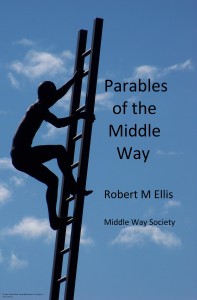Once upon a time, there was a lonely and dissatisfied prince. He lived in a castle with everything he could ever wish for. Every toy he could want, servants to fulfil his every desire, musicians and storytellers to entertain him. He was educated by tutors, who never complained of his application to his studies. He would also go out in the grounds and excel in sports – particularly in archery and fencing. His parents doted on him, for he seemed to be the ideal young prince. He was fit and handsome and well-educated. He did everything that was expected of him.
Every so often, though, he would sneak away from the servants to go and sit under a tree. At that point he loved the silence, listening only to the birds in the trees. He often felt more content then than during any of his amusements. But at the same time, he sometimes became aware of a deeper dissatisfaction – a sense that his life was missing something important.
When he grew older, his parents arranged a marriage to a noble girl who was lovely, kind and thoughtful, insisting that the marriage take place in the chapel of the castle, and that the young couple continue to live in one of the wings. For a while, the prince forgot almost everything in his bride’s arms. They had a little son, and he, too, was charming. He felt the pride of a young father.
And yet, he didn’t entirely lose his habit of sneaking away to sit under a tree. The next time he did so, he began to muse about the walls of the castle grounds and what lay beyond them. It was only then that he realised he had never been beyond those walls.
He went to see his parents. “Why have I never been outside the castle?” he asked. “Other people go away, on trips and visits and tours, do they not? Why have I not been on any of those?”
His mother frowned. “We didn’t want you to be uncomfortable on long journeys, or get any of the bad habits some people have out there” she said. “If you would like more guests to divert you, we could bring them into the castle. Why do you want to go outside?”
“I want to see what it’s like outside.”
“Ah, well, I suppose you are old enough to decide for yourself” she sighed. “But do keep the castle servants with you for your own protection. You don’t know how rough it can be out there: people wanting to trick you or rob you.”
It was agreed that the prince could go outside with his old tutor, and they got into the carriage together. “Where do you wish to go, sir?” asked the coachman.
“Anywhere. Outside.”
“Would his highness prefer a ride in the countryside, perhaps, or a trip to the town?”
“Take me to the town.”
So, within quite a short time they were clopping through cobbled streets. The prince looked out of the windows and gazed at everything. He saw rows of severe houses built from grey stone. He saw stray dogs and cats. He saw workmen tramping to and fro. He saw traders hawking their wares. He saw prostitutes sitting on doorsteps with too much make-up and half-unlaced bodices. He saw beggars with hollow cheeks and missing limbs. He saw a starving child who had died in the hands of her frantic, emaciated young mother. He saw ladies and gentlemen in fine clothes picking their way superciliously through this chaos.
“Stop!”
The coach drew to a halt at his command, and the prince began to get out.
“Where are you going? Let me come with you, sir” said the old tutor, mindful of his duty to guard the young prince.
“No” said the prince. “I wish to go alone. Wait here and I will come back when I am ready.”
The prince picked his way over unfamiliar cobblestones, marvelling at everyone and everything he saw. “Good day, sir!” cooed a prostitute, “Would you like a good time with me?”
The Prince turned to her: “Why are you dressed like that? Have you no better way to earn your living?”
“None, sir. But do take kind pity on me sir, and I can make it worth your while in pleasure.”
“I do pity you” replied the Prince, “But I have pleasure enough already.” He put down his hand to find his purse, only to discover it was gone. He looked round and found some ragamuffin boys scuttling away at the end of the street. Still, he was not distressed. He had never known lack of money to be a problem.
A little further on, he again came across the emaciated young mother carrying a dead child. She sat on a doorstep, lost in depression.
“I am sorry for your loss, miss” he said, “But will you not bury your child?”
“I have no money to pay the gravedigger” she replied slowly. “Will you help me, sir? You look both rich and kind.”
“I wish I could give you some money,” said the Prince, “But my purse has been stolen. Here.” He took off his wedding ring and gave it to her. “Have this instead. Perhaps you can sell it.”
The young woman gasped. “You are very generous, sir, but I cannot accept this.”
“Why ever not?”
“Because it is your wedding ring, sir, and if I was your wife I would not be happy at that. I know what it is like to be wronged by a man, sir.”
“I am leaving her anyway. I have to look for something better – something better than a comfortable life in the castle with her. Something that addresses all this.” The Prince had not decided this until he found himself saying it. “My wife will be well looked after. She lives in a castle and is the daughter-in-law of a king.”
The young woman looked at him wide-eyed, as though she was unable to decide whether to believe him or not. The Prince forced the ring into her hand and turned away.
After that he wandered aimlessly through the filthy streets, his mind in turmoil. Did he really mean what he had just said? Why had he said it? Then he realised that finding answers was far more important to him than obeying his parents or feeling comfortable and secure. He would have to endure discomfort and insecurity and find out what that was like. He felt secure about his wife and child. It wasn’t that he didn’t love them – he did – but other things were more important for the moment. He had no duty to provide for them that would not readily be fulfilled by others. He felt sure that he could come back to his wife in future, and they would pick up their loving relationship where they had left off.
He never returned to where the coach was waiting. After several hours they returned to the castle and raised the alarm. Dozens of servants were dispatched to scour the town. But they were too late. They never found him.
Several months later, a thin-looking young man, dressed in rags, appeared at the door of the Bishop. The Bishop was a great scholar, a great theologian and a well-known churchman of his time. The young man in rags rang the front-door bell, and the butler answered. “Round the back!” snapped the butler, “How dare you ring the front door bell?”
“Sorry” replied the Prince disarmingly. “Old habits die hard. I know my place as a homeless beggar, but that’s not my background. Please could I speak to the bishop?”
The butler was taken aback. This was just not how homeless beggars spoke or behaved in his experience. After some muttering, he went to the Bishop and explained the situation. The Bishop told him to show the young man in.
They then had a long conversation. The Prince was completely frank about his background, and about why he had left home and resigned his royal status. “But I know almost nothing about religion” he said. “I need to find a deeper truth, a purpose to my life, and I am told that you are a great religious teacher. Please will you instruct me?”
The bishop, who was a discerning and sincere man, was so taken by the young man in rags and his story that he agreed immediately to take him in – and also not to unnecessarily let his presence be known to the parents, who were still hunting for him. “I do not have a great deal of time” he said, “But as my duties allow, I could supervise your studies in theology. In return, though, perhaps you could contribute to the household a little. Are there perhaps some skills you already have in which you could tutor my young children?”
The Prince searched his mind. “Erm, archery? fencing?”
The bishop looked doubtful as to whether these were suitable occupations for his children. “Well” he said at length, “We can see whether they show any interest in learning such pursuits.”
The Prince stayed with the bishop for two years after that. His life was regular and disciplined in that house, his diet sparing, and his time given largely to study, thought and prayer. By the end of this time he could read Greek, Latin and Hebrew with some fluency. He knew the Bible well and was also familiar with the commentaries, church fathers and main theological writers. His special delight, however, was the mystics. He immersed himself in Margery Kempe, Richard Rolle, The Cloud of Unknowing, Julian of Norwich, Hildegard of Bingen, and Meister Eckhart. He tried all their spiritual exercises, and tried to immerse himself in the love of God. But somehow he never felt that he succeeded. Love, yes, he could feel plenty of that – open, charitable love. But when he was told that the love of God was higher than that, that he must resign himself utterly, he was filled with a recognition, not just that he could not give up his human love, but that this was not the right path, not quite. He could not resign himself to God, any more than he could resign himself to the authority of his parents. Not that he could not live like that obediently for a while, but there was a more important moral urge within him.
After two years, the Prince came up to the Bishop and told him he had decided to move on. “I am very grateful indeed for your taking me in, and for your instruction” he told the Bishop, “But I have realised that the religious life is not quite what I am looking for – not quite. I need to move on. A shame, when your children’s archery is coming on so well, but I’m sure you can find them another archery instructor.”
“We will miss you” said the Bishop, “You have become a valued member of the household. Where will you go? What will you do?”
“I have no idea” replied the Prince. “Last time I left my old life without the faintest idea where I was going, and this time I expect it will be the same. Somehow I will find a way.”
So the Prince went forth once again. After leaving the house of the Bishop, he wandered up into the hills. He sat on a rock amongst the heather looking down at the town below, considering. In his first life, he reflected, he had had every desire fulfilled, yet he had been under the power of his parents at every minute. Their suffocatingly conventional beliefs about good princely behaviour had been the only value he knew, but those beliefs were built on – what? Convention, tradition, social status, family honour. In his second life, on the other hand, his desires had been well-controlled, his life disciplined by religious beliefs. But what were these beliefs based on? On God’s authority, on the Bible, on the Church. In some ways this life seemed to be opposite to the first, but in many ways it was also the same. There were many social expectations, there was authority, and there was his will, apparently opposed to that authority. Did goodness only consist in obedience? He could not understand how that could be so.
Did either of these ways of life help the young woman with the dead child in her arms, or her kind? Not really. The young woman suffered from not being free, from being exploited by the rich and by men, from not being educated or able to judge for herself, from not being able to realise her potential. Those who based their teachings on power, whether it was the power of God or of human traditions, would not address her needs. Perhaps they sincerely meant to – to fulfil Christ’s message to give to the poor, for example – but the very way they justified their messages, through authority, would undermine this sincere intention.
It was not that the Prince did not believe in God, he decided, it was that he did not feel that God was an authority that he should follow. After all, all the ideas about God’s will came from the speeches and writings of men. The right way to judge, the right way to live his life – that did not come from authorities, but from the sense of balance within his experience.
At last the Prince was clear. He did not need to look any further for a profound truth. All he needed was a direction, a method of thinking. If he knew how to judge the right direction in any situation, he would know how to act. He realised that he should learn from whoever he met, that they would all help him understand the world around him, but that he should live life on his own terms. When someone told him what to do, he should listen and weigh their views, but not accept their power over him. He would make his own decisions, not in reaction but in discourse, open but firm.
As the sun set, the Prince loped down the hill. Half an hour later, he had found a stagecoach to take him to the town by the palace. The next day, he walked into the castle, past the astonished servants, but did not first go to see his parents. He went to see his wife and son and embraced them. “I’ve been missing you so much” she said, distraught with joy. “It’s been a long time. They told me you were dead, but I didn’t believe them.”
“I’m sorry” he said, and his eyes filled with tears. “I was away of my own will. I needed to work out how to live my life, but now I am clearer. The first thing I suggest is that you must move out of this castle. I cannot come back to live here. We need a place of our own.”
***************************************************************************************
Rewriting the life of the Buddha
Anyone familiar with the life of the Buddha should recognise here a somewhat transmogrified version of the earlier part of it. I take the early life of the Buddha, not as a piece of history (though it may also, at least in some respects, be that) but as an inspiring parable. I feel entirely free to alter the telling of any parable so as to bring out one aspect or another of its message, for its significance lies in the universal patterns it reveals, not in particular historical claims. In this case, the message of the parable is the nature of the Middle Way, so I felt that this message could be brought out more directly for a Western audience by transposing the story to a more Western setting (I imagine England a few centuries ago, but please do not let us get caught up on details of historical accuracy that are no more relevant to the significance of the story here than they would have been in ancient India).
The traditional Buddhist narratives of the life of the Buddha also tend to focus on the Buddha’s achievement of nirvana. I, however, am not so much interested in this supposed achievement as in the approach or method he was said to have used to achieve it – the Middle Way. Placing the discovery of the Middle Way in England also enables it to be shorn of many cultural accretions that are merely Indian, and to explore what such a discovery might have meant if it had happened in England. Whilst it is very easy (at least, for me, with a thoroughly universalised account of its meaning) to place the discovery of the Middle Way in England, it would be much more difficult to imagine the enlightenment, loaded as it is with specific cultural and religious expectations from its Indian context, taking place in England. Added to this, I do not think it is at all significant whether or not the enlightenment took place. It may have done for all I know, but this supposed achievement is very often made the basis of authority claims in the Buddhist tradition that in my view are not compatible with the Middle Way. At the very least, then, it needs to be omitted from the story here, so as to provide a clear and uncluttered account of the recognition of the Middle Way.
The most significant lines of the story, however one chooses to flesh them out, are of a confined young person in a place of highly conventional (and thus relative) values, followed by a traumatic confrontation with the full difficulties of wider conditions. In an attempt to be adequate to these wider conditions, and with an intuition of a deeper meaning, the young man leaves the scene of his confined youth and wanders the wider world. He then learns from religious teachers who offer a supernaturally-authorised, highly disciplined way of life. Although he learns much from this training, it does not fulfil what he is intuitively looking for and he moves on. After engagement with both these extremes, then, learning from each but in the end firmly moving on, the young man hits on the Middle Way: the need to avoid dogmas on either side, together with subjection to the power that uses them. Such avoidance of dogmas, positive or negative, will enable him to avoid delusions that cause limitations on both sides and engage more effectively with conditions of all kinds. Such a narrative could conceivably be told in all sorts of different ways, set in different times, places and cultures.
“Engaging effectively with conditions”, is a necessarily broad phrase if we are to understand the Middle Way in a sufficiently flexible and relevant way – not even just, it should be noted, a question of overcoming suffering, important and ambitious enough though that is. However unexciting the phrase may sound, though, “engaging effectively with conditions” is one hell of a big deal. It may mean, for example, providing adequate education for the poor and improving the status of women. It may mean personal or political action on global warming. It may mean improving your relationship with your mother. It may mean following through an artistic impulse repressed in earlier life. The fact that one cannot specify anything as concrete as any of these examples in defining the Middle Way does not mean that any of these things are not what it might mean in practice for you. It does mean, as long as we describe the Middle Way in such a broad way, that we are even-handedly engaging with whichever of them turn out to be relevant to our lives.
In the case of the Prince, then, when thinking about how to end the story, I fell to considering how he could apply the Middle Way most relevantly to his life. It seems obvious that he has, at least, unfinished business to engage with in relation to the young family he left behind, and thus that his first application of the Middle Way should be, not to go back to his previous confined life in the castle, but at least to engage with the important conditions represented by his family in a more balanced way. To move his family out, particularly in a culture where that would presumably have been at least a possibility, thus seems the best solution. Coming from where he comes from, and being at the point he was, that seems more important than going on to have profound meditation experiences or founding a monastic order – not that we should rule out either of those possibilities for his subsequent life.
The Buddha’s abandonment of his wife and child is always a difficult point in the interpretation of the original story – one where I have often found Buddhists getting rather defensive in support of their hero’s honour. This aspect of the story conveys the ideal of complete renunciation of wealth and family life found in Indian religious culture, in both Hindu and Buddhist traditions, but I would not accept the culturally relativist gloss of “It was OK for him in his time and place”, for much more universal issues are at stake. There may be times when renunciation of some kind is a necessary part of distancing oneself from old habits and assumptions, so as to oblige oneself to move on new and better ones, and that is the positive part of what the story conveys for me. However, there is no denying the likely long-term psychological effects of a father’s early desertion (let alone a mother’s): how negative these may be depend very much on the context, but it is very hard to see them as positive either from the child’s or the other parent’s point of view, even if (as in the Buddha’s and the Prince’s case) there are no issues of financial or practical support.
Having been myself, during the time when I was a practising Buddhist, irresponsibly encouraged to desert my young family by some senior Buddhist practitioners, who had little detailed understanding of my context, I do think the interpretation of this part of the story needs challenging. Renunciation is not a good thing to be absolutised in itself. Nor is it always bad, but a great deal of caution needs to be exercised before encouraging it, when others are affected. Renunciation is also probably best seen not as an all-or-nothing matter, as it often is. Those who need to renounce may limit the social damage by making it a temporary or partial measure, and it seemed to me that for the Prince’s absence for two years followed by a re-unification with his family was the best way of showing an application of the Middle Way in the story: it tried to do justice both to the importance of his quest, and to the importance of his family relationships.
This story portrays a Middle Way that is a principle of judgement, avoiding the extremes of either positive or negative dogma. The ways those dogmas are revealed in the Prince’s early life are primarily as absolute and relative values – moral absolutism and moral relativism. I think these are also the most relevant and important extremes that are avoided in the traditional life of the Buddha, the ‘eternalism’ and ‘nihilism’ of the Buddhist tradition being largely ways of representing this moral opposition in terms of the argument going on in ancient India about the eternal self or its absence.
For moral absolutists, such as the Bishop, there needs to be some absolute source of authoritative values, and some mechanism by which these absolute demands can be fulfilled regardless of human weakness and sinfulness. For ancient Indians, this was the device of multiple lives occurring through rebirth, allowing one enough time to do the incredible amount of work on oneself that was necessary to become enlightened. Eternalism (belief in the eternal, transmigrating self) thus went hand-in-hand with moral absolutism. For European Protestants, with only a single life, though, the device is salvation by faith, whereby those who believe sufficiently in Christ’s sacrifice can gain admission to heaven, and avoid having to fulfil the exacting demands of God’s law. The ‘nihilists’ in ancient India denied the eternal self, and thus more importantly denied the absolute ethics that went with it, leading them to fall back on conventional values or individual preferences. In England, on the other hand, I imagine that all that is required to be ‘nihilist’ (in the earlier centuries when outright atheism was extremely rare) is to be rather conventional and not worry too much about salvation by faith, worrying about what the neighbours think more than what God may think. In either context, the important contrast lies between moral absolutism and moral conventionalism, and it is this opposition that the Prince encounters and eventually goes beyond.
There is thus a deep connection between the Middle Way as depicted in this story and that in the life of the Buddha, in terms of the extremes avoided. Similar stories could potentially be created, though, where the extremes were rather different – for example, freewill and determinism, or realism and idealism. All that is really required is that the opposed beliefs involved contradict each other and give rise to opposing values. The parable story of the hero (who could of course be female, or a different age) merely needs to show the same dialectical structure, in which the benefits of each extreme are recognised and incorporated into a better, more integrated view.
I could thus potentially write a whole book of variations on the life of the Buddha. Apart from a Christian version, we could have a Muslim and a Jewish one. We could have variety of cultures and locations, ages, social statuses, gender, sexual orientation, political viewpoints… The Middle Way, as I keep saying, is universal. If I have maintained a certain conservatism in some respects here (for example, keeping the hero as a young male with high social status) it is from a wish to keep some incidental thematic connections with the original. It is also not surprising, that being myself a white English middle-class male, I want to write about a Buddha that is not too far away, so that I can still feel culturally at home with him myself. But I invite others to experiment with multiple variations on this theme that convey their own experience.
Picture: Buddha leaving his family: mural from temple in Sarnath, photo by Ajay Tallam (CCSA 2.0)
Other Middle Way parables: Achilles and the Tortoise, An Acre of Forest, The Lute Strings, The Ship, The Boredom of Heaven, Ten Variations on the Good Samaritan, The Firefighter and the Stockbroker





